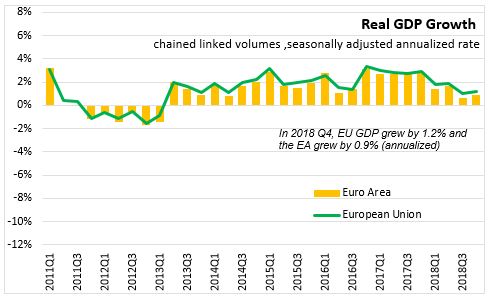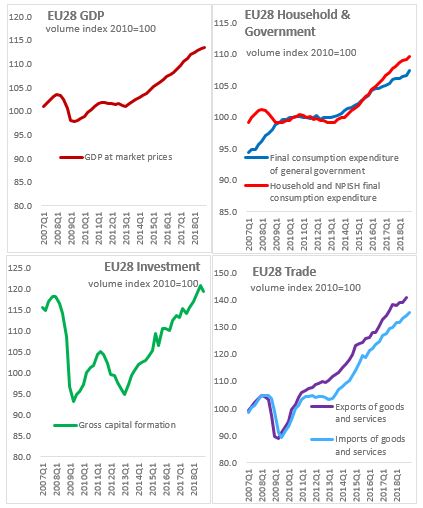The Economics and Statistics Division maintains archives of previous publications for accountability purposes, but makes no updates to keep these documents current with the latest data revisions from Statistics Canada. As a result, information in older documents may not be accurate. Please exercise caution when referring to older documents. For the latest information and historical data, please contact the individual listed to the right.
<--- Return to Archive
For additional information relating to this article, please contact:
March 07, 2019EU AND EURO AREA GDP, Q4 2018 [REVISED] 
In the revised estimate, Eurostat reports that real GDP rose by 1.2 per cent (seasonally adjusted annualized rate) in the European Union and by 0.9 per cent in the Euro Area in the final quarter of 2018. Previous estimates of growth in the fourth quarter were 0.2 and 0.1 percentage points lower for the European Union and the Euro Area. Real GDP growth has been slower in 2018 compared to 2017.
Comparing Q4 2018 with Q4 2017, seasonally adjusted GDP rose by 1.1 per cent in the Euro Area and 1.4 per cent in the European Union.
The estimation of annual growth for 2018 are that GDP grew by 1.8 per cent in the Euro Area and 1.9 per cent in the European Union.
For the EU28, real household consumption growth slowed to a 1.6 per cent increase in 2018 compared to the 2.1 per cent in 2017. Gross capital formation growth was faster in 2018 with an increase of 3.8 percent. Growth in exports of goods and services slowed to 2.9 per cent in 2018 compared to 5.6 per cent in 2017. Import growth also slowed.

For 2018, household consumption growth slowed to 1.3 per cent compared to 1.8 per cent the previous year in the Euro Area. For EA19, gross capital formation expanded at a faster pace with growth of 3.4 per cent. Exports from the Euro Area were up 3.0 per cent, a slower pace than the 5.5 per cent in 2017.

Source: Eurostat
<--- Return to Archive